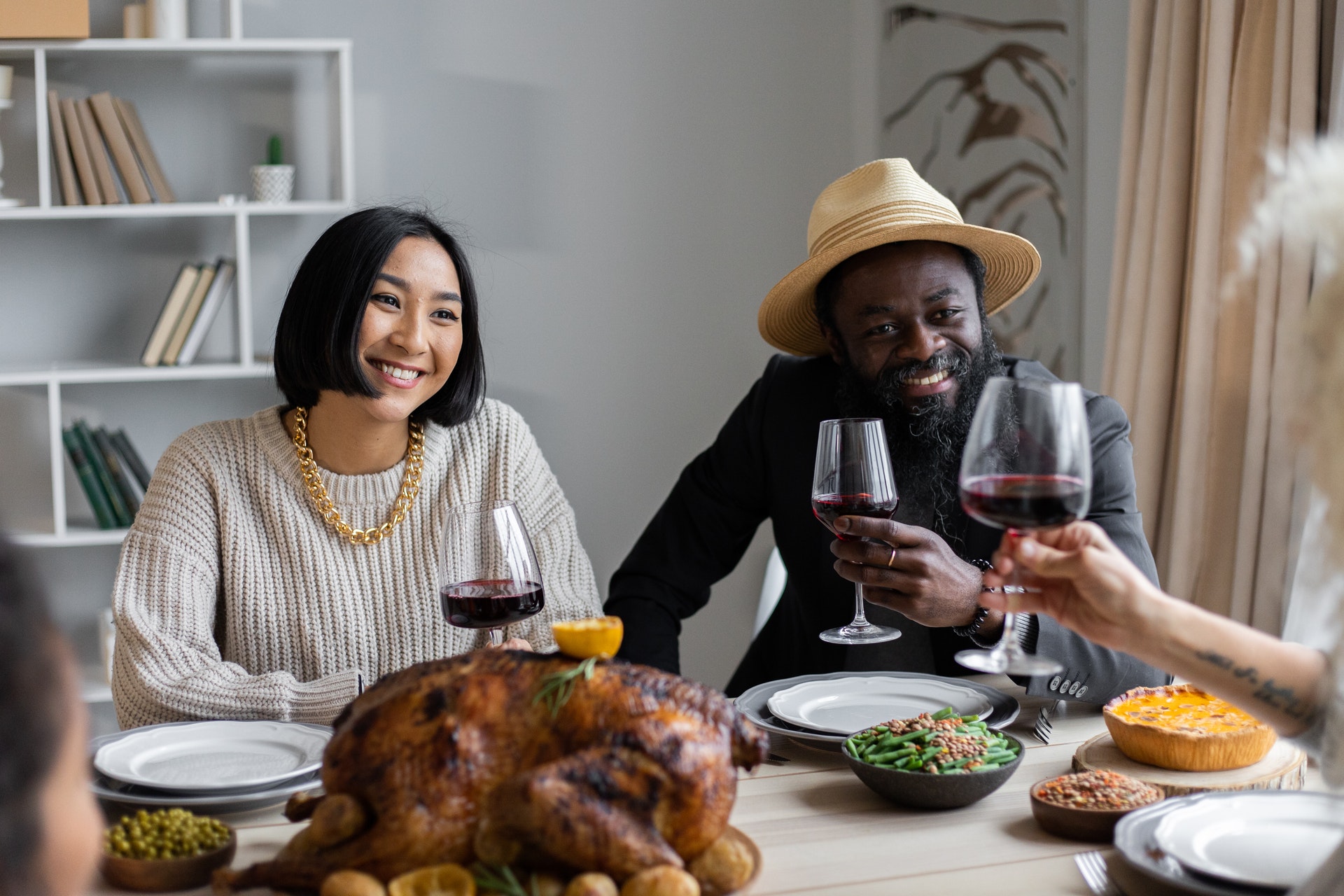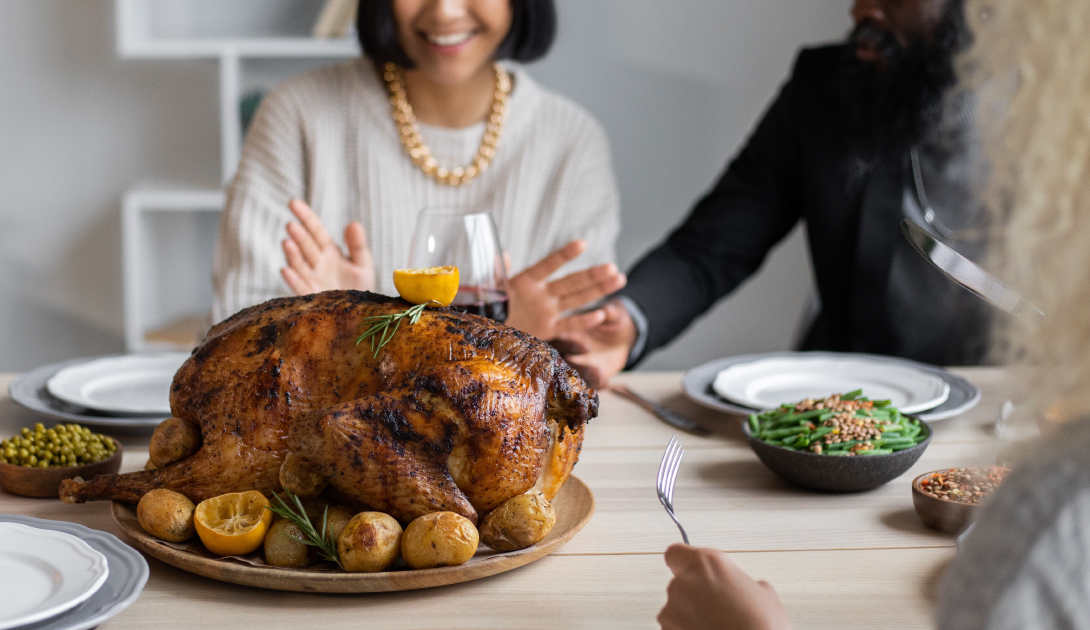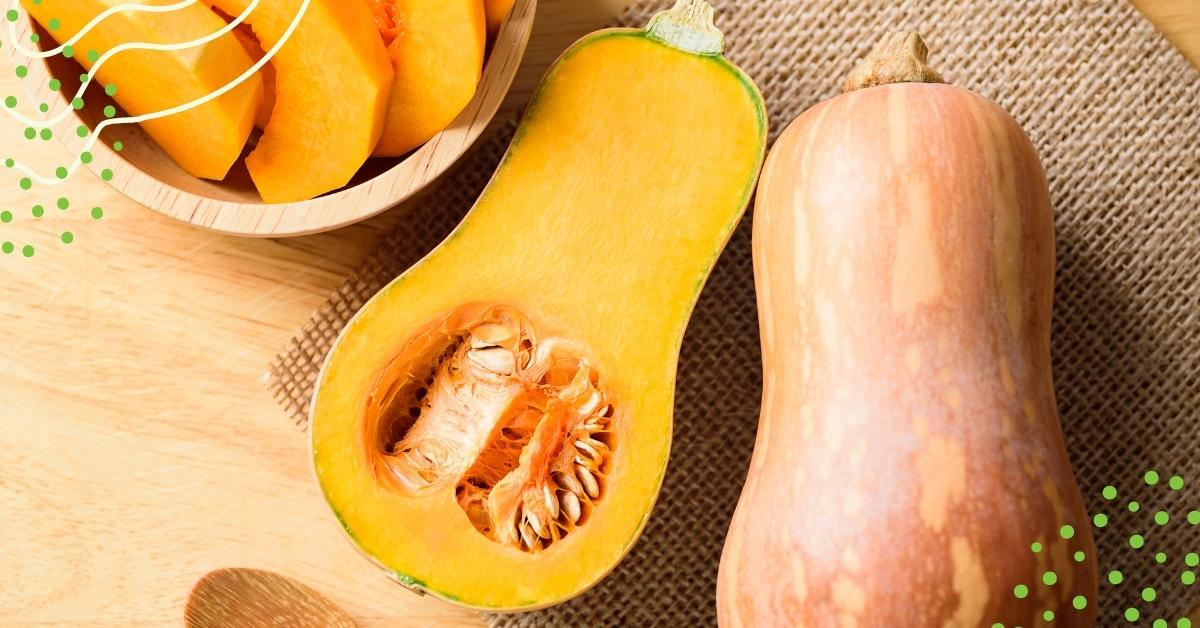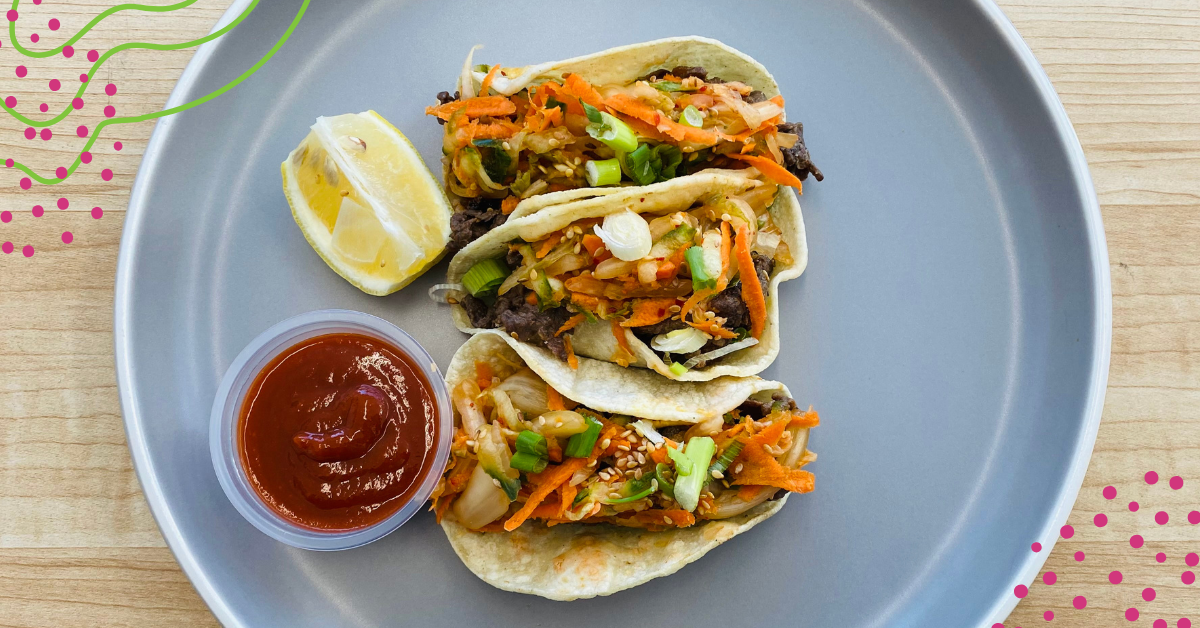We’ve all had that moment of realizing that we’re mindlessly shoveling in another forkful of food. Some of us might not even realize that we’ve been eating on autopilot until our crumb-dusted hands feel the empty inside of a party-sized chip bag. Rote eating is something that many of us fall into because of life’s fast pace. How many times have you gobbled up a sandwich in four bites just to be able to walk into a meeting on time? “Netflix eating” is also a real problem. Eating while binging on the latest season of Ozark causes us to attune our senses to what’s on the screen. This is great except that we then no longer pay attention to our taste buds. During the holidays, many people fall into the trap of distracted eating. The sheer volume of food put in front of us can cause us to feel pressure to try everything. As a result, we’re in a frenzied state of eating without savoring our food. So, how can we practice mindful eating this holiday? Read on for some tips. But first, let’s first talk about distracted eating.
The Problem With Distracted Eating
The problem is that eating without intention causes us to eat more. “Distracted” eating can be especially dangerous when it comes to consuming larger portions unintentionally. An extensive analysis done by researchers on the topic of “eating awareness” a few years ago sheds some light on this problem. It showed just how much more likely we are to overeat when eating under the influence of distraction.
How Likely We Are To Overeat When Distracted
When looking at 24 studies, researchers found that eating when distracted consistently produced a moderate boost in immediate intake. When we begin a meal in a distracted state, we tend to start eating extra straight out of the gate. Furthermore, starting a meal while distracted causes us to increase intake as our eating continues. Think of it like a “snowball effect.”
Is there anything that can stop it? According to this review, there are three key takeaways to combat distracted eating. Here they are:
- Enhancing memory of food consumed reduced later intake. That means that slowing down to pay attention to what you’re eating can prevent you from overeating at subsequent meals.
- Removing visual information about the amount of food eaten during the meal increases immediate intake. Luckily, this is one of the easiest oversights to fix. We’ll cover the tips in just a minute!
- Incorporating attentive-eating principles into one’s lifestyle may aid both weight loss and maintenance without the need for conscious calorie counting.
Distracted eating can happen anywhere. However, many people have concerns about losing perspective about what’s on their plates with the holidays approaching. The stress of holiday shopping and worries over holiday finances can cause us to not pay attention to what we eat. Even good things like spending time with family or the carefree joy that comes from having time off can cause distracted eating.
That’s not to say that a little bit of indulgence isn’t welcomed on big feasting days like Thanksgiving. However, the goal should be to enjoy some controlled indulgence instead of distracted indulgence.
How to Stay Present During Holiday Meals
Take a look at some smart tips for being more aware and paying more attention to what you eat over the holidays.
Mindful Eating Tip #1: Focus on Nutrition First
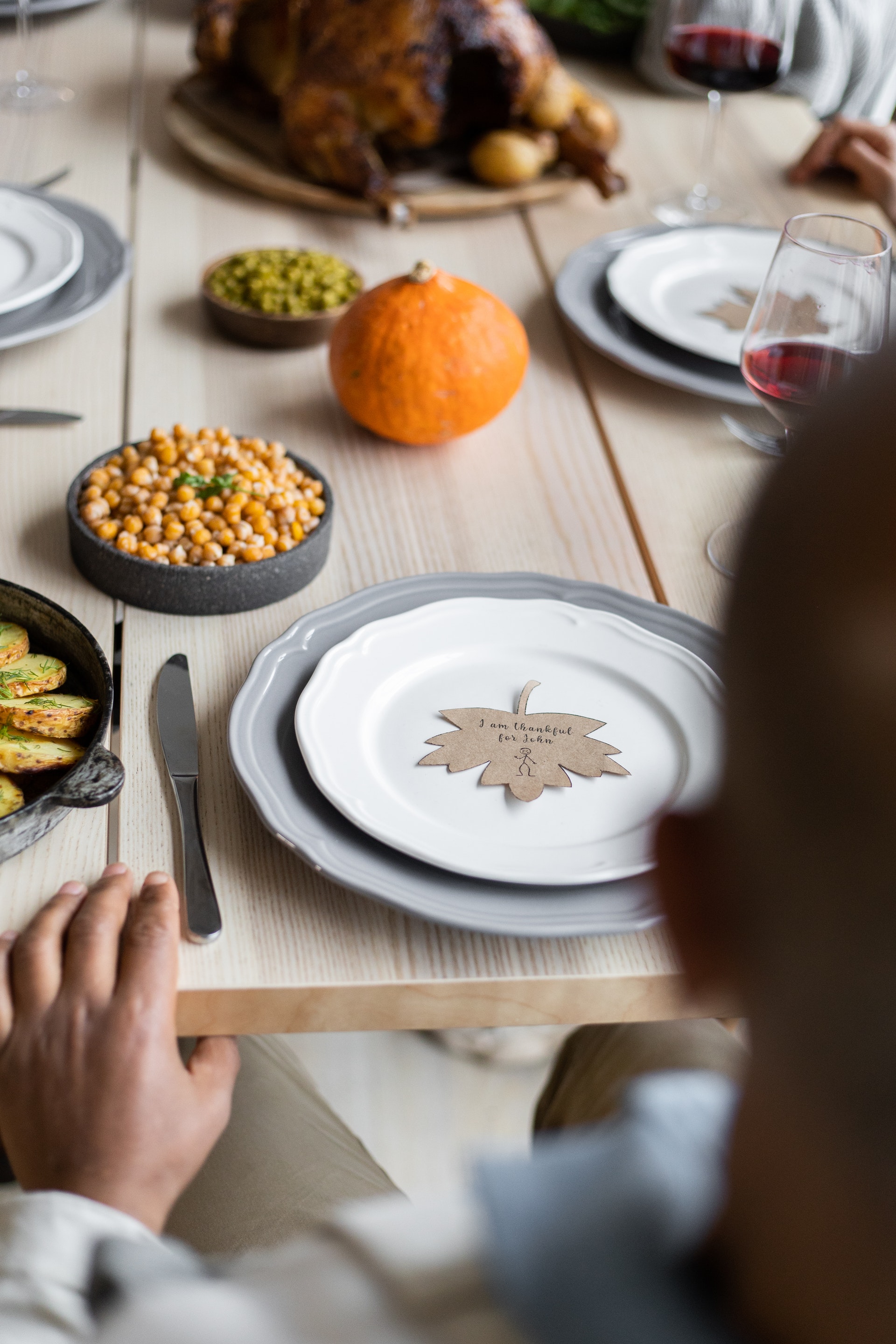
Before you approach a spread packed with all kinds of starchy, sticky and sweet foods, make a deal with yourself: to focus on nutrition first. Choose to load your plate first with nutritional foods rather than ones that are simply “yummy.” You should also eat the most nutritious things off your plate first. This will help you fill up on goodies like steamed broccoli or lean turkey before diving into the buttery biscuits. You’re not restricting what you can eat. Instead, you’re prioritizing foods that nourish you. The bonus is that you won’t be quite so ravenous when you do finally work your way to the desserts. Starting your meal by being mindful about what you’re eating will set you up to remain mindful.
Mindful Eating Tip #2: Don’t Grab the Big Dish
Pay attention to the size of your plate! While this may seem simple enough, the reality is that most of us have been programmed to “fill our plates” regardless of the size. In fact, we rarely stop to even consider the way that plate size impacts portion size. According to some experts, it’s not uncommon for a person to end up eating 25 percent to 50 percent more food from a bigger dish! There’s a way around this. First, if you are at a gathering, try to grab a dish that’s close to the size you use for your meals at home. If the dishes only come in one size, estimate the size of your “normal” dish within the larger dish. Only fill your plate to cover your regular portion size from home!
Mindful Eating Tip #3: Don’t Socialize Near the Food
This little hack is helpful for holidays, parties and work meetings! Proximity to food makes us more likely to dip our hands in! In a study looking at how visibility and convenience influence candy consumption, researchers placed candy dishes in work settings to see if proximity influenced how much candy study participants would eat. The results of this study were surprising. People ate nine candies when a dish was on the desk. When the candy was placed in a drawer, they ate six. When participants had to get up from their desk, they ate only four pieces!
It’s easy to see how being able to simply “reach” for food makes it more challenging to practice mindful eating. When the food is further away, it gives you more time to think about whether or not you really want that food.
Mindful Eating Tip #4: Start the Day With Your Own Breakfast
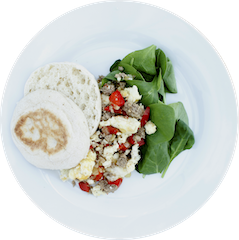
Getting your day off to a rocky start that includes grabbing for whatever is available can set you up for a day of distracted, mindless eating. We can’t always control what others are going to serve at events like holiday gatherings. However, we can control what we eat before we get there. Pay special attention to breakfast if it’s the only meal of the day that you can control. By practicing mindful eating earlier in the day, you can better avoid distracted eating later in the day. You are setting yourself up for mindful eating all day long!
Here are a couple of ideas for a mindful breakfast. Prepare a hearty egg scramble that keeps you feeling full and energized. The healthy proteins will get you in the mindset for healthy meals without a sense of deprivation for the rest of the day. If you stay at someone’s house overnight before a big holiday, take along something easy and convenient like overnight oats.
Mindful Eating Tip #5: Keep Your Plate Away From the Television
This might just be the most important tip of all! Being distracted by shows, movies and videos may be one of the most significant unknown health risks people face today! Eating while watching television around the holidays can be especially dangerous! Want to know why? This is a time of year when holiday baking shows flood the airways and streaming services. A study from University of Surrey found that watching cooking shows and videos can cause us to eat more.
Of course, eating while gathered around the television for any reason can cause us to eat more. What many people don’t realize is that eating while watching television makes food less satisfying. As a result, we keep going back for more because we aren’t satiated quite as easily.
Having our senses occupied by the screen can also cause us to miss critical cues that tell us we’ve eaten enough! There’s also a “time” component. Making the decision to eat while watching a television show locks in our “eating time” for the duration of that show. This may cause us to go back for “seconds” several times to remain in a state of eating until the end of the program we’re watching!
What to do instead? Practice mindful eating by making the decision to start a show or movie after eating for the evening.
Final Thoughts: Mindful Eating Makes the Holidays More Enjoyable
Mindfulness elevates the experience of eating. It’s important to remember that mindfulness isn’t a punishment designed to stop us from seeing food as a means of enjoyment. The opposite is true. Mindfulness allows us to live in the moment with our plates instead of feeling like we’re always chasing the pleasure that’s dulled by distraction.
